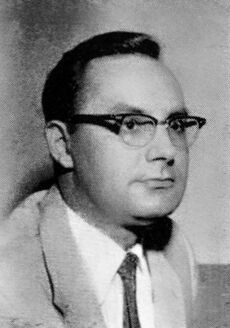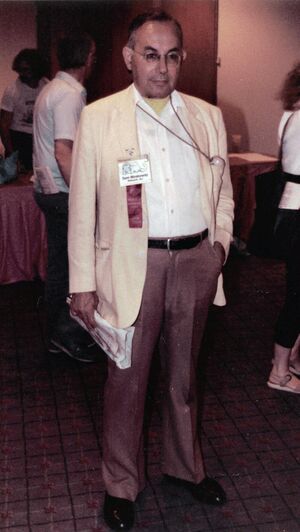Sam Moskowitz
(June 30, 1920 – April 15, 1997)
Samuel Moskowitz, aka SaM, was one of the creators of fandom, a member of First Fandom, chairman of the first Worldcon, writer, critic, book and fanzine collector, and historian of the field. He was large man — one friend described him as "physically massive" — with a booming voice.
His most well-known work is undoubtedly The Immortal Storm, a historical review of internecine warfare within fandom in the 1930s, in which feuding he was an avid participant. It was written with so much over-the-top seriousness that, as fellow fan historian Harry Warner, Jr. said, "If read directly after a history of World War II, it does not seem like an anticlimax." In spite of that, it remains the essential record of the invention of fandom.
His detractors nicknamed him Foghorn Samuel, the Newark Neanderthal and De Fuhrer of Newark Swamps.
The I-CON Sam Moskowitz Award and the Sam Moskowitz Archive Award were named in his honor.
Contents
Fan[edit]
Sam found fandom as a teenager in 1936 and began published the fanzine Helios in June 1937. He also organized a branch of the Science Fiction League.
In 1938, after leading the First National SF Convention in his hometown, Newark, NJ, he organized New Fandom, while at the same time Donald A. Wollheim and others were organizing the Futurians. The Futurians' Marxism conflicted with Moskowitz's focus on sf and fandom and he, Will Sykora and Jimmy Taurasi (the Triumvirs) feuded with the Wollheimists. At age 19, when Sam became chairman of the First Worldcon held in New York City in 1939, he barred several Futurians from the convention, allegedly for fear they would disrupt it, an event usually called the Exclusion Act.
He was the founder of ESFA. He co-chaired Metrocon 1 and was an adviser to the Silvercon committee.
He was Mystery Guest at the Clevention in 1955. The Mystery Guest was one of the GoHs, but his identity was not announced in advance of the convention. Moskowitz was not informed in advance, either, and many people feel that this was a sort of second-rate Worldcon GoHship, which was surely less than his due.
He was a noted collector. “I never threw anything away,” SaM told the BBC in 1965.
Pro[edit]
Starting in 1953 Moskowitz edited Science-Fiction Plus, a prozine owned by Hugo Gernsback. In the 1960s and ’70s, he edited two dozen anthologies, and a few single-author collections, but his most enduring work is likely to be his writing on the history of science fiction, in particular two collections of short author biographies:
- Explorers of the Infinite, a book of articles on the predecessors of modern SF, mostly reprints of articles previously published in prozines. It was published in hardcover by World Publishing in 1963 with a paperback edition from Meridian Books in 1966.
- Seekers of Tomorrow.
He also published Under the Moons of Mars: A History and Anthology of "The Scientific Romance" in the Munsey Magazines.
Personal Life[edit]
He was married to fellow fan Dr. Christine Haycock (Chris Moskowitz). SaM’s siblings Pearl, Morris and Herman "Harry" Moskowitz attended the first Worldcon, possibly only in support of their brother, as we’ve so far found no evidence of their continuing fanac.
In mundane life, Sam was for many years editor of the trade publications Quick Frozen Foods and Quick Frozen Foods International, for which he used the pseudonym Sam Martin.
A few years before his death, he had throat cancer, which required the surgical removal of his larynx. He was able to speak via an electronic voice-box held against his throat, and continued to appear at cons.
More Details[edit]
- Entry in The Encyclopedia of Science Fiction.
- A short, early biography: Who's Who in Fandom 1940, page 11.
- Sam Moskowitz: A Bibliography and Guide by Halbert Hall (2017): a bibliography/guide to the writings of Moskowitz including a profile of SaM as a fan.
- Audio interview of SaM by Fred Lerner, 1963.
- Amazing BBC interviews of SaM and Hugo Gernsback, 1965.
- Brief biography in September, 2017 National Fantasy Fan.
- After All These Years: Sam Moskowitz On His Science Fiction Career (Niekas, 1991) is a 96-page paperback publication, edited by Fred Lerner, "based on a postal interview conducted by Jeffrey Elliot." Contents include Moskowitz's memories of the beginnings of SF fandom, his interactions with important early SF writers and editors, his published anthologies (and ghost editing), his personal SF collection, and a comprehensive bibliography of his work in the field.
- Moskowitz materials at the Internet Archive: Page 1, Page 2.
- Works at Project Gutenberg.
- FindAGrave entry.
- SaM’s reminiscences of Worldcons for the Noreascon Three PB:
- After Ten Years -- A Tribute to Stanley G. Weinbaum [1945] (with Gerry de la Ree)
- Charles Fort: A Radical Corpuscle [1976]
- Current Fantasy [1938]
- Different [1938-1977] (with Christine Moskowitz for FAPA)
- Helios [1937–38] (with Alex Osheroff)
- The Science Fiction Circular [1938]
- Vad-Jong [1939]
Awards, Honors and GoHships:
- 1955 -- Clevention
- 1956 -- Philcon 1956
- 1971 -- DeepSouthCon 9
- 1974 -- First Fandom Hall of Fame Award
- 1981 -- Pilgrim Award
- 1990 -- Raymond Z. Gallun Award
- 1982 -- MystiCon II
- 1987 -- VCON 15
- 1995 -- Archon 19
| Person | 1920—1997 |
| This is a biography page. Please extend it by adding more information about the person, such as fanzines and apazines published, awards, clubs, conventions worked on, GoHships, impact on fandom, external links, anecdotes, etc. See Standards for People and The Naming of Names. |

